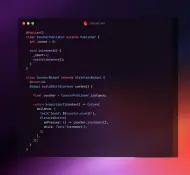subpub 0.0.1-dev.9  subpub: ^0.0.1-dev.9 copied to clipboard
subpub: ^0.0.1-dev.9 copied to clipboard
A lightweight and efficient state management solution for Flutter implementing the publisher-subscriber pattern with automatic dependency tracking and macro-powered code generation
SubPub #
A lightweight and efficient state management solution for Flutter that implements the publisher-subscriber pattern with automatic dependency tracking.

Features #
- 🎯 Simple Publisher-Subscriber Pattern: Easy-to-understand state management approach
- 🔄 Automatic Dependency Tracking: Subscribers automatically track their dependencies
- 🛠 Macro-powered: Uses Dart macros for clean and efficient code generation
- 🎨 Flutter-first: Designed specifically for Flutter applications
- 🔒 Type-safe: Fully type-safe state management
- 🏃 Minimal Boilerplate: Create publishers with minimal code
Installation #
Add subpub to your pubspec.yaml:
dependencies:
subpub: ^0.0.1
Important Note About Dart Macros #
SubPub uses Dart's experimental macros feature. Due to the current experimental state, there are some important setup steps and known issues to be aware of:
- Enable the macros experiment in your project's
analysis_options.yaml:
analyzer:
enable-experiment:
- macros
-
Known VS Code Issue: Due to a current limitation in how VS Code handles macro definitions from external packages (dart-lang/sdk#55670), you might encounter issues where the analyzer doesn't detect macro-generated definitions. If this happens:
Workaround:
- Go to the definition of the
@Publishmacro (using "Go to Definition" in your IDE) - Then return to your project files
- The definitions should now be correctly detected and available
This is a temporary limitation of the experimental macros feature and will be resolved in future updates.
- Go to the definition of the
Usage #
Basic Example: Single Publisher #
First, let's look at a simple counter example using a single publisher:
// Define your publisher and annotate it with the @Publish macro to
// automatically generate getters for private fields and ensure the
// publisher is a singleton instance.
@Publish()
class CounterPublisher extends Publisher {
// Only create private fields, public getters will be generated automatically!
int _count = 0;
void increment() {
_count++;
notifyListeners();
}
}
// Use it in a widget
class CounterWidget extends StatelessWidget {
@override
Widget build(BuildContext context) {
final counter = CounterPublisher.instance;
return Subscriber((context) => Column(
children: [
// Easily access state using public getters anywhere in a Subscribers scope!
Text('Count: ${counter.count}'),
ElevatedButton(
onPressed: () => counter.increment(),
child: Text('Increment'),
),
],
));
}
}
Advanced Example: Multiple Publishers #
Now let's look at how to use multiple publishers together:
// Define multiple publishers
@Publish()
class ThemePublisher extends Publisher {
bool _isDarkMode = false;
void toggleTheme() {
_isDarkMode = !_isDarkMode;
notifyListeners();
}
}
@Publish()
class UserPublisher extends Publisher {
// Would not recommend initialising values with empty strings, bools etc.
// Prefer using null/optional (fpdart), late or sealed class types.
// But for this example we'll just use an empty string.
String _username = '';
void updateUsername(String newName) {
_username = newName;
notifyListeners();
}
}
// Use multiple publishers in a single widget
class DashboardWidget extends StatelessWidget {
@override
Widget build(BuildContext context) {
final counter = CounterPublisher.instance;
final theme = ThemePublisher.instance;
final user = UserPublisher.instance;
return Subscriber((context) => Container(
color: theme.isDarkMode ? Colors.black : Colors.white,
child: Column(
children: [
Text('Welcome, ${user.username}!'),
Text('Count: ${counter.count}'),
ElevatedButton(
onPressed: () => theme.toggleTheme(),
child: Text('Toggle Theme'),
),
ElevatedButton(
onPressed: () => counter.increment(),
child: Text('Increment Counter'),
),
],
),
));
}
}
The @Publish macro automatically:
- Creates a singleton instance
- Generates getters for private fields
- Handles dependency tracking
How it Works #
- The
Publisherclass extendsChangeNotifierto provide state change notifications Subscriberwidget automatically tracks which publishers are accessed during the build- When a publisher's state changes, only the dependent subscribers are rebuilt
- The
@Publishmacro generates boilerplate code for better developer experience
Best Practices #
- Keep publishers focused on a single responsibility
- Use private fields with public getters for read-only state
- Call
notifyListeners()after state changes - Use the singleton instance provided by the
@Publishmacro
License #
This project is licensed under the MIT License - see the LICENSE file for details.
Author #
Paurini Taketakehikuroa Wiringi
